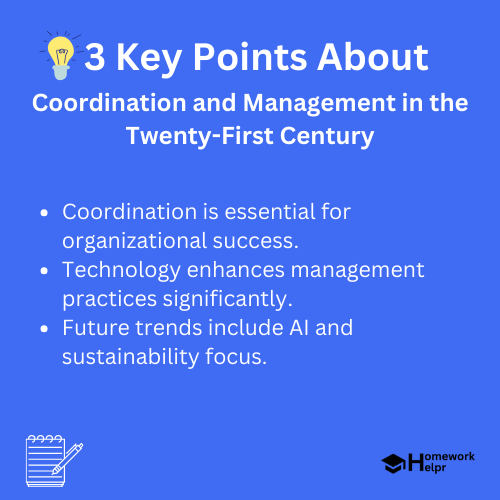📝 Summary
In the twenty-first century, effective coordination and management are crucial for organizational success amidst rapid changes, global challenges, and technological advancements. Modern practices such as Agile Management, remote team management, and data-driven decision making play a key role in enhancing communication, collaboration, and flexibility. Organizations must also navigate challenges like resistance to change and resource allocation while embracing technology to streamline processes. Emphasizing diversity, sustainability, and innovation will shape the future of management as companies adapt to the dynamic business landscape.
Coordination and Management in the Twenty-First Century
In today’s fast-paced and ever-evolving world, effective coordination and management have become more crucial than ever before. Organizations of all sizes and sectors are facing a multitude of challenges that require innovative solutions and streamlined processes. This article will delve into modern management practices and the essential role of coordination in achieving organizational goals.
The Importance of Coordination
Coordination refers to the process of organizing and synchronizing activities to ensure that a team or organization meets its objectives efficiently. In the twenty-first century, with globalization and technological advancements, coordination has become critical for success. Here are some key aspects of coordination:
- Communication: Clear and effective communication channels are vital for successful coordination. Team members must share information and feedback swiftly.
- Collaboration: Teamwork is essential in achieving collective outcomes. Collaborative tools facilitate this, enabling teams to work together seamlessly.
- Flexibility: Fast-changing environments require adaptability. Teams must be able to pivot strategies and resources quickly to respond to new challenges.
Definition
Coordination: The arrangement of activities to ensure they work together effectively.
Modern Management Practices
The landscape of management has changed dramatically due to technological advancements and shifting workplace dynamics. Here are some modern management practices that have emerged:
- Agile Management: This approach focuses on flexibility and responding to change rather than sticking rigidly to a plan.
- Remote Team Management: The rise of remote work has prompted organizations to adopt new tools and strategies to manage teams online effectively.
- Data-Driven Decision Making: Utilizing data analytics allows managers to make informed decisions based on actual evidence rather than intuition.
Definition
Data-Driven Decision Making: The process of making decisions based on data analysis rather than personal judgment.
Examples
For instance, a software development team may adopt the Agile Management approach, allowing them to break projects into smaller segments, conduct regular assessments, and make necessary adjustments promptly.
Technology and Management
Technology plays a pivotal role in enhancing coordination and management. It provides tools that facilitate communication and streamline processes. Some examples of how technology is transforming management practices include:
- Project Management Software: Tools like Trello and Asana help teams keep track of tasks and deadlines.
- Video Conferencing: Platforms such as Zoom or Microsoft Teams allow teams to communicate effectively, regardless of their physical location.
- Cloud Computing: Enables real-time collaboration and ensures that team members have access to data from anywhere.
Definition
Cloud Computing: The delivery of various services over the internet, including storage, databases, and servers.
Challenges in Coordination and Management
Despite the advancements in technology and management practices, organizations still face numerous challenges. The most common challenges include:
- Resistance to Change: Employees may resist new practices, fearing that changes will disrupt their routines.
- Communication Barriers: Unclear or insufficient communication can lead to misunderstandings and a lack of coordination.
- Resource Allocation: Effective management of resources ensures that teams have what they need to succeed.
Definition
Resource Allocation: The process of distributing available resources among various projects or business units.
Examples
For example, a company may face resistance when implementing a new project management tool, with employees hesitant to abandon familiar methods.
❓Did You Know?
Did you know that the concept of “management” dates back to ancient civilizations? The Egyptians had managers overseeing the construction of the pyramids!
Case Studies in Effective Coordination and Management
Examining real-world examples can provide valuable insights into effective coordination and management. Here are two successful organizations that have adopted modern management practices:
- Google: Utilizes a flat organizational structure promoting minimal layers of management, enhancing collaboration across teams.
- Amazon: Emphasizes data-driven decision-making and customer feedback, demonstrating how better service can lead to increased loyalty.
Examples
For instance, Google encourages its employees to spend 20% of their work time on side projects which fosters innovation and keeps employees engaged.
The Future of Coordination and Management
As we move further into the twenty-first century, coordination and management will continue to evolve. Here are some trends that are likely to shape the future of management:
- Artificial Intelligence: AI will help automate routine tasks, allowing managers to focus on strategic planning.
- Diversity and Inclusion: Future teams will prioritize diverse backgrounds and perspectives, enhancing creativity and innovation.
- Sustainability: Organizations will focus more on sustainable practices and corporate social responsibility.
Definition
Corporate Social Responsibility: A business model in which companies incorporate social and environmental concerns in their operations.
Conclusion
In conclusion, coordination and management in the twenty-first century are pivotal for organizational success. With the integration of modern management practices and technology, organizations can better navigate the complexities of today’s business environment. By understanding the importance of coordination, embracing new management methods, and tackling emerging challenges, individuals and organizations can thrive in a rapidly changing world. The future promises exciting developments, and adapting to these changes will be essential for sustainable growth and success.

Related Questions on Coordination and Management in the Twenty-First Century
What is the role of coordination in management?
Answer: Coordination helps organize activities to achieve objectives efficiently.
What practices are emphasized in modern management?
Answer: Agile management and data-driven decision making are key.
What challenges do organizations face in management?
Answer: Resistance to change and communication barriers are common.
How is technology transforming management?
Answer: Technology provides tools for improved communication and collaboration.
